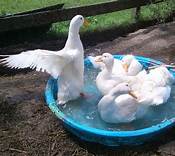How Are Ducks as Pets?
Ducks are popular pets for those who live in rural or suburban areas. They are relatively low-maintenance animals, but they do have some unique needs that potential owners should be aware of.

Temperament
Ducks are generally friendly and social animals. They are also very active and playful, so they need a large space to roam. Ducks are not typically aggressive, but they can become territorial if they feel threatened.
Housing
Ducks need a coop that is large enough for them to move around comfortably. The coop should be well-ventilated and have a dry floor. Ducks also need access to a water source for swimming and bathing.
Diet
Ducks are omnivores and will eat a variety of foods, including insects, plants, and grains. A commercial duck feed is a good option for pet ducks, but it should be supplemented with fresh fruits and vegetables.
Health Care
Ducks are generally healthy animals, but they are susceptible to a few common diseases. These include duck viral enteritis, duck hepatitis, and avian influenza. Regular checkups with a veterinarian are important for keeping ducks healthy.
Lifespan
The average lifespan of a pet duck is 5 to 10 years. However, some ducks can live for up to 20 years.
Pros of Owning a Duck
There are many benefits to owning a duck. These include:
- Ducks are relatively low-maintenance animals.
- Ducks are friendly and social.
- Ducks are active and playful.
- Ducks can help to control pests in your garden.
- Ducks can provide eggs for your family.
Cons of Owning a Duck
There are also some drawbacks to owning a duck. These include:
- Ducks can be noisy.
- Ducks can be messy.
- Ducks can be destructive to your garden.
- Ducks can carry diseases that can be transmitted to humans.
Conclusion
Ducks can be great pets for those who live in rural or suburban areas. They are relatively low-maintenance animals, but they do have some unique needs that potential owners should be aware of. If you are considering getting a duck as a pet, be sure to do your research and make sure that you are prepared to provide the care that they need.
Declaration: All article resources on this website, unless otherwise specified or labeled, are collected from online resources. If the content on this website infringes on the legitimate rights and interests of the original author, you can contact this website to delete it.





